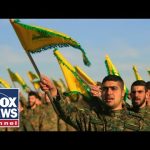In a world often fraught with conflict, Israel is once again in the spotlight. Recently, Israel’s Defense Forces (IDF) have ramped up their operations against Hezbollah, a militant group with deep ties to Iran. This situation has escalated into a high-stakes game of chess, where key pieces are being removed from the board. Reports have emerged detailing Israel’s successful targeting of high-ranking Hezbollah operatives, including Ibrahim Akeel, who is believed to have played a significant role in orchestrating attacks against Israel.
Israel appears to be sending a clear message: they are not just reacting to the threats posed by Hezbollah but are proactively working to dismantle the group’s leadership structure. By executing precision strikes and effectively knocking out communication lines, Israel aims to create a “fog of war” that complicates Hezbollah’s ability to retaliate or plan further attacks. This strategy is not just about immediate security; it’s about establishing what military experts call “escalation dominance.” In simpler terms, Israel wants to ensure that if a larger conflict arises, Hezbollah will be significantly weakened and less formidable than before.
There’s a growing sentiment that we may be inching closer to a larger conflict. Hezbollah has been relentless, launching numerous rocket attacks daily, which forced the evacuation of hundreds of thousands of Israelis living in northern regions. These actions have severe economic consequences, hitting Israel where it hurts the most. With little help from the United States, which seems more focused on de-escalation than direct involvement, Israel has taken matters into its own hands. People are left wondering why the U.S. isn’t more engaged in supporting its ally in this high-stakes conflict.
While some speculate about the motivations behind Hezbollah’s aggressiveness, it seems evident that neither Hezbollah nor Iran are eager for full-scale war. In fact, the idea of a conventional war is likely to be more feared by them than anything else, mainly because they stand to lose significantly in that scenario. However, their continued assaults necessitate Israel’s firm stance and aggressive strategy. Unlike some international powers that might shy away from confrontation, Israel appears determined to address the threat head-on before it spirals even further out of control.
What’s concerning, however, is America’s relative absence in coordinating a united front against this militant group. As Israel is executing tactical strikes, critics argue that the U.S. could play a stronger supportive role, particularly regarding other groups like the Houthis, who threaten trade routes and stability in the region. It seems Israel has taken the lead in counterterrorism efforts where the U.S. has faltered, leaving one to ponder whether this is the new normal—an outsourcing of America’s counterterrorism responsibilities to its allies.
As the dust settles on recent events, there are unanswered questions about the region’s future. If history is any indicator, the coming days may not bring the peace many hope for. In fact, the take on the ground often points to the reality that tomorrow might not be brighter. With a complex array of interests and threats playing out on this stage, the world watches closely as Israel and Hezbollah continue their dangerous dance, each move more significant than the last. The stakes are high, and the outcomes remain uncertain. Is there a chance for lasting peace, or are we merely witnessing the prelude to something more substantial? Only time will tell, but whatever unfolds will undoubtedly rip through the pages of history.




